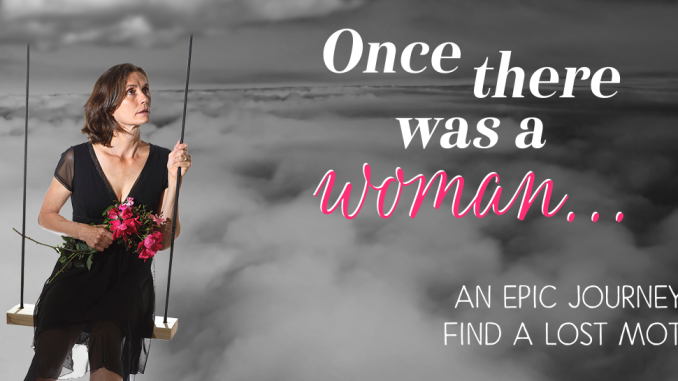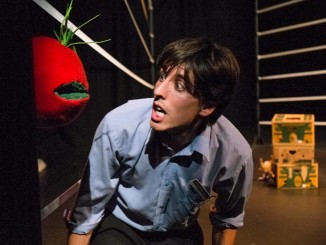
[Into the Void]
Theatre is a visual medium, I was reminded shortly after viewing Beth Kayes’ solo performance Once There Was a Woman. Its an observation more commonly applied to film, but if anything it’s more true for the stage. Theatre withholds as much as it shows, drawing magic not just from what we see, but from what is absent and Kayes’ piece is very much an exploration of absence, grief and memory. This informs both the story it tells and its highly effective use of Q Loft. We may be used to thinking of solo works – especially a stripped back, spartan piece like this – as belonging to more intimate spaces. But here we see how one woman and a chair can fill a much larger space just as easily – the negative space is not empty, but filled with the wonder and ambiguity of Kayes’ work.
Once There Was a Woman “came from the shock and pain of losing a loved one” the programme notes explain. Yet this is not as straightforward a look at either death or life as you might expect. At times Kayes deals directly with the subject of her mother’s passing, and at others breaks off on tangents dealing with her own childhood, her daughter and more fantastical matters. All of this allows the piece a great sense of authenticity – there is no enforced narrativization, only a journey that traverses what psychological terrain it needs to in order to find an understanding of its subject. It accurately portrays the erratic nature of memory, the way we rarely remember our experiences in a logical order, instead following a more emotional through line. As a result it feels real and grounded despite its often shifting emphasis.
Kayes also pinpoints the difficulty of summing up a human being based solely on one’s own experiences of them. Storytelling allows us to fill in some of the gaps, but not all. The show ends in a kind of fable as Kayes constructs a tale that might let her reach her mother again one last time, but this ends in a surreally ambiguous fashion, wittily referencing the limitations and unreality of the stage environment. Storytelling can only go so far providing closure and quite rightly Kayes does not try to invent a resolution, however much she, and we by extension, may hope for one.
Kayes is a charismatic performer who maintains our focus throughout. The performance expands and contracts, at times accommodating larger flourishes of physicality, at others shrinking down so that nothing seems to exist beyond the chair that forms the sole piece of set. Kayes is perfectly comfortable performing on all scales, melding her adeptness with physical theatre with the poetry of her script. It’s a gentle, sensitive performance that smartly keeps the emotion of the piece bubbling under.
Once There Was a Woman is a simple and highly effective piece. The absence of its subject is mirrored in its theatrical sparseness, the lack of embellishment allowing the space to stand in for the void of uncertainty that follows death, a void its creator probes movingly. It’s a neat melding of the thematic and practical aspects of theatre into a performance that satisfies despite its deliberately inconclusive nature.
Once There Was a Woman plays as part of Auckland Fringe until 3 March. Details see Q.




Leave a Reply